Communist China On Track With Plan to Replace US as Superpower: Michael Pillsbury
The Soviets once warned the United States about China: “China has betrayed us in Moscow. And you are next. They’re going to squeeze you dry, and then they’re going to turn on America.”That’s according to Michael Pillsbury, director for Chinese strategy at the conservative think tank The Hudson Institute, who sounded the warning in an interview on EpochTV’s “American Thought Leaders” program. The warning came in 1969; Pillsbury was at his first job at the United Nations (U.N.) after completing a doctorate in Chinese studies at Columbia University. One of his assignments was to read Central Intelligence Agency materials about Russia’s view of China. Years earlier, relations between the two communist powers had ruptured to the point of complete estrangement. Through these classified documents, Pillsbury learned the Soviets’ perspective: “China had global ambitions to take off the communist movement, first from the Soviet Union, and then dominate the whole world.” However, the Soviets’ warning wasn’t taken seriously then by Pillsbury or the United States. It “sounded to me like a boyfriend talking about his ex-girlfriend, warning that she’d break my heart like she broke his,” Pillsbury wrote in his book “The Hundred-Year Marathon: How China’s Secret Strategy to Replace America as the Global Superpower. Driven by wishful thinking or what Pillsbury in his book describes as “false assumptions,” such as that fragile China needed help, China was on the path to democracy, and “China wants to be—and is—just like us,” the U.S. government ignored the Soviets’ warning. U.S. President Joe Biden meets with Chinese leader Xi Jinping on the sidelines of the G20 leaders’ summit in Bali, Indonesia, on Nov. 14, 2022. (Kevin Lamarque/Reuters) Such wishful thinking has persisted in the decades since, with a temporary pause during the Trump administration. Chinese communist leaders have been able to achieve this, according to Pillsbury, through a strategy of “inducing complacency to avoid alerting [the] opponent” of Beijing’s real intentions. Winning a race is easier when your opponent doesn’t know that the race has begun, Pillsbury noted in his book. And Chinese leaders want to keep it this way as long as possible. As a result of this strategy, the Chinese regime is still on track with their plan to take over the world, the author said in the interview. “The ultimate mistake is activating the enemy whom you could have stolen from, [who] could have fueled your power to rise to number one,” he said. “That’s why Xi Jinping has been so careful,” Pillsbury added, referring to the Chinese Communist Party (CCP) leader who recently secured an unprecedented third term in power. “Xi Jinping has avoided giving the Americans a Sputnik moment or a Pearl Harbor attack that would galvanize our country.” ‘The Hundred-Year Marathon’ The hundred-year marathon, the title of Pillsbury’s book, refers to communist China’s long-term effort to realize its “strong nation dream,” mentioned in Xi’s maiden speech in his new role as the CCP general secretary in 2012. The plan is built around a narrative highlighting the West’s humiliation of China in the 19th and early 20th centuries. Against this backdrop, China seeks to rise to become the new hegemon, replacing the incumbent: America. The aim is to achieve this goal by 2049, the 100th anniversary of the Party’s takeover of China. In the book, Pillsbury said the CCP learned many strategies from China’s history, especially the Warring States period, a tumultuous era of 200 years that ended when the Qin Dynasty first unified China in 221 BC. During that period, seven states fought one another through alliances and betrayals. The central theme of this era, according to the CCP’s historical interpretation, is that one state would rise above and rule the world. Hiding one’s strength until the optimal striking moment was thus essential to achieve that objective. Pillsbury described the Warring States framework as a major underpinning of the Chinese communist playbook for dominating the world. According to him, America needs to map the current competitive situation with China, and take specific actions to address the challenge posed by the communist regime. He called the extremely tough rhetoric utilized by some U.S. officials and scholars, such as those calling for a complete decoupling from China, a “hoax” because he didn’t think super hawks—those who take a hardline approach to China—were focused enough on legislation and policies that can make a difference. Blanket hawkish rhetoric without specifics is unlikely to win votes in Congress, Pillsbury said. China’s President Xi Jinping (R) talks to former president Hu Jintao as he is assisted to leave from the closing ceremony of the 20th Chinese Communist Party’s Congress at the Great Hall of the People in Beijing on Oct 22, 2022. (Noel Celis/AFP via Getty Images) Chinese Politics ‘Obscure and Secretive’ During the regime’s all-important 20
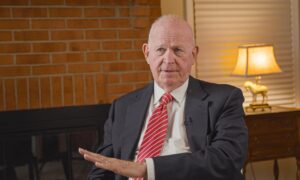
The Soviets once warned the United States about China: “China has betrayed us in Moscow. And you are next. They’re going to squeeze you dry, and then they’re going to turn on America.”
That’s according to Michael Pillsbury, director for Chinese strategy at the conservative think tank The Hudson Institute, who sounded the warning in an interview on EpochTV’s “American Thought Leaders” program.
The warning came in 1969; Pillsbury was at his first job at the United Nations (U.N.) after completing a doctorate in Chinese studies at Columbia University. One of his assignments was to read Central Intelligence Agency materials about Russia’s view of China.
Years earlier, relations between the two communist powers had ruptured to the point of complete estrangement.
Through these classified documents, Pillsbury learned the Soviets’ perspective: “China had global ambitions to take off the communist movement, first from the Soviet Union, and then dominate the whole world.”
However, the Soviets’ warning wasn’t taken seriously then by Pillsbury or the United States.
It “sounded to me like a boyfriend talking about his ex-girlfriend, warning that she’d break my heart like she broke his,” Pillsbury wrote in his book “The Hundred-Year Marathon: How China’s Secret Strategy to Replace America as the Global Superpower.
Driven by wishful thinking or what Pillsbury in his book describes as “false assumptions,” such as that fragile China needed help, China was on the path to democracy, and “China wants to be—and is—just like us,” the U.S. government ignored the Soviets’ warning.
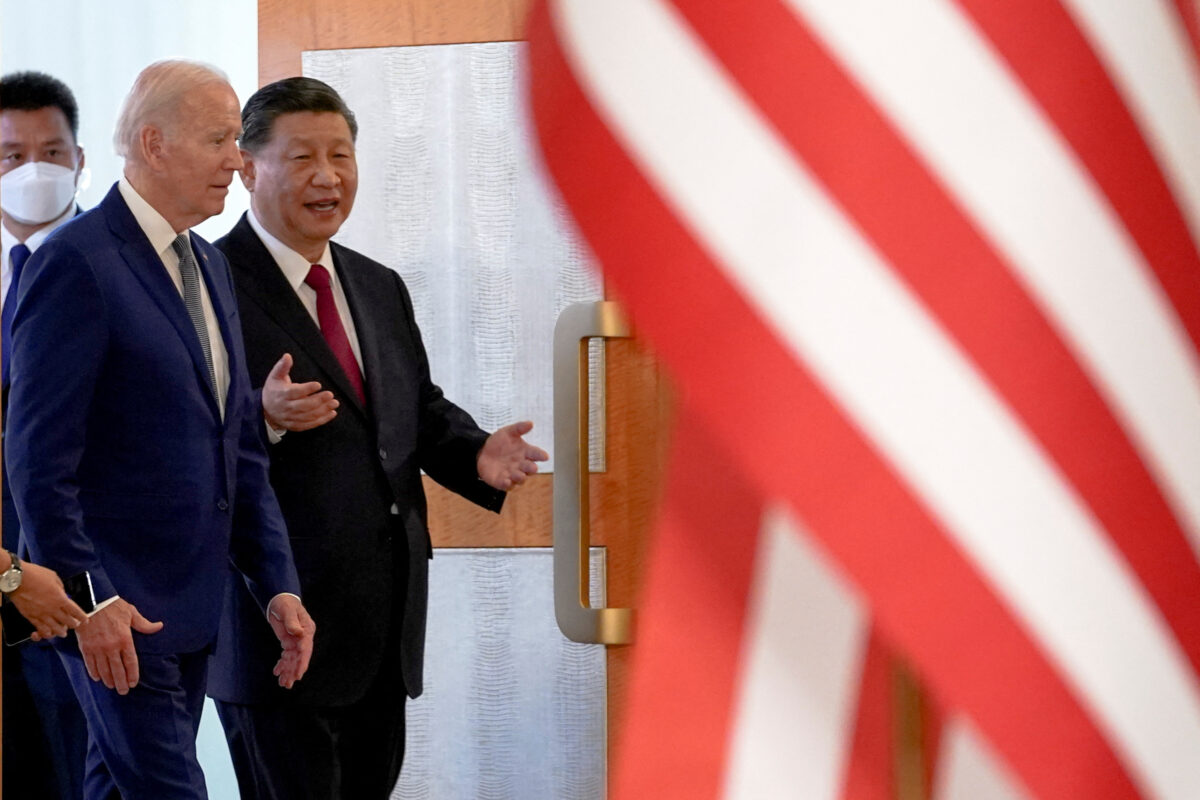 U.S. President Joe Biden meets with Chinese leader Xi Jinping on the sidelines of the G20 leaders’ summit in Bali, Indonesia, on Nov. 14, 2022. (Kevin Lamarque/Reuters)
U.S. President Joe Biden meets with Chinese leader Xi Jinping on the sidelines of the G20 leaders’ summit in Bali, Indonesia, on Nov. 14, 2022. (Kevin Lamarque/Reuters)
Such wishful thinking has persisted in the decades since, with a temporary pause during the Trump administration.
Chinese communist leaders have been able to achieve this, according to Pillsbury, through a strategy of “inducing complacency to avoid alerting [the] opponent” of Beijing’s real intentions.
Winning a race is easier when your opponent doesn’t know that the race has begun, Pillsbury noted in his book. And Chinese leaders want to keep it this way as long as possible.
As a result of this strategy, the Chinese regime is still on track with their plan to take over the world, the author said in the interview.
“The ultimate mistake is activating the enemy whom you could have stolen from, [who] could have fueled your power to rise to number one,” he said.
“That’s why Xi Jinping has been so careful,” Pillsbury added, referring to the Chinese Communist Party (CCP) leader who recently secured an unprecedented third term in power.
“Xi Jinping has avoided giving the Americans a Sputnik moment or a Pearl Harbor attack that would galvanize our country.”
‘The Hundred-Year Marathon’
The hundred-year marathon, the title of Pillsbury’s book, refers to communist China’s long-term effort to realize its “strong nation dream,” mentioned in Xi’s maiden speech in his new role as the CCP general secretary in 2012. The plan is built around a narrative highlighting the West’s humiliation of China in the 19th and early 20th centuries. Against this backdrop, China seeks to rise to become the new hegemon, replacing the incumbent: America. The aim is to achieve this goal by 2049, the 100th anniversary of the Party’s takeover of China.
In the book, Pillsbury said the CCP learned many strategies from China’s history, especially the Warring States period, a tumultuous era of 200 years that ended when the Qin Dynasty first unified China in 221 BC. During that period, seven states fought one another through alliances and betrayals.
The central theme of this era, according to the CCP’s historical interpretation, is that one state would rise above and rule the world. Hiding one’s strength until the optimal striking moment was thus essential to achieve that objective. Pillsbury described the Warring States framework as a major underpinning of the Chinese communist playbook for dominating the world.
According to him, America needs to map the current competitive situation with China, and take specific actions to address the challenge posed by the communist regime. He called the extremely tough rhetoric utilized by some U.S. officials and scholars, such as those calling for a complete decoupling from China, a “hoax” because he didn’t think super hawks—those who take a hardline approach to China—were focused enough on legislation and policies that can make a difference. Blanket hawkish rhetoric without specifics is unlikely to win votes in Congress, Pillsbury said.
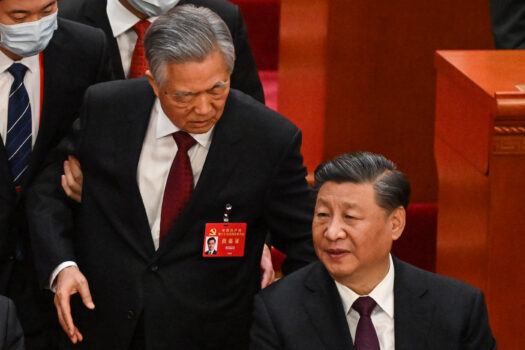 China’s President Xi Jinping (R) talks to former president Hu Jintao as he is assisted to leave from the closing ceremony of the 20th Chinese Communist Party’s Congress at the Great Hall of the People in Beijing on Oct 22, 2022. (Noel Celis/AFP via Getty Images)
China’s President Xi Jinping (R) talks to former president Hu Jintao as he is assisted to leave from the closing ceremony of the 20th Chinese Communist Party’s Congress at the Great Hall of the People in Beijing on Oct 22, 2022. (Noel Celis/AFP via Getty Images)
Chinese Politics ‘Obscure and Secretive’
During the regime’s all-important 20th Party Congress in October, a twice-a-decade meeting during which Xi secured his bid for a third term as CCP leader, one particular incident drew considerable attention.
On the first day of the weeklong event, former CCP leader Hu Jintao was escorted out of a meeting in front of all present media.
Chinese state-run media would later say Hu was removed for health reasons. The statement was posted only on Twitter, which is inaccessible in China.
Many, though, were unconvinced by the official explanation.
Pillsbury said he, too, like many others, watched the video clip of Hu’s removal several times. He interpreted it as “a sign of Xi Jinping’s power that even a former president can be dismissed with a wave of the hand.”
This recent incident reminded Pillsbury of the “obscure and secretive” nature of Chinese politics. The opacity of Party’s inner workings was such that the U.S government wouldn’t find out about the significant power struggles within the CCP until well after the fact, Pillsbury observed.
He recalled that as a China expert at the think tank RAND Corporation, the first-ever memo he wrote to then-national security advisor Henry Kissinger in 1973 was about 10 significant internal CCP power struggles and how the Americans only learned about them afterwards through the storytelling of the winners.
The policy issues at play in these power struggles, Pillsbury said, are “really quite chilling.
“They are debating whether or not to take a really serious, aggressive step. And sometimes the moderates win; sometimes the hawks win. But this is all obscured to the outside world,” he said.
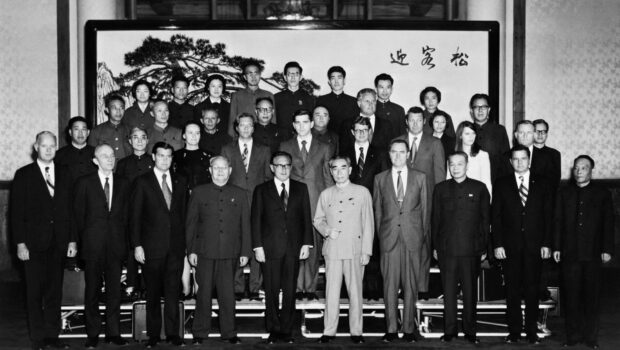 US president Nixon’s special advisor, Henry Kissinger (5 CL) and Prime Minister Zhou Enlai (6 CL)pose with their delegations for a group photo, on October 22, 1971, in Beijing. U.S. Security Advisor Henry Kissinger traveled to China to meet with Prime Minister Zhou Enlai to set the stage for President Richard M. Nixon’s historic visit in 1972. (-/AFP via Getty Images)
US president Nixon’s special advisor, Henry Kissinger (5 CL) and Prime Minister Zhou Enlai (6 CL)pose with their delegations for a group photo, on October 22, 1971, in Beijing. U.S. Security Advisor Henry Kissinger traveled to China to meet with Prime Minister Zhou Enlai to set the stage for President Richard M. Nixon’s historic visit in 1972. (-/AFP via Getty Images)
Pillsbury gave an example during Kissinger’s second trip to China in October 1971, a month after Mao Zedong’s second-in-command Lin Biao died in an airplane crash: “They [the Chinese] had already killed off their vice president, the chairman of the Joint Chiefs of Staff, quite a few military leaders, and Kissinger is taking his motorcade to go see the Chinese Prime Minister, and he does not know this has happened.”
In his book, Pillsbury detailed how the American government was unaware of the CCP infighting and underestimated the strength and influence of the Chinese hawks.
He listed “China’s hawks are weak” as one of five false assumptions underlying America’s wishful thinking on China, along with the more commonly known notion that “engagement brings complete cooperation.” Over the decades, the United States had hoped that Beijing would, through engagement, cooperate with Washington, and ultimately be assimilated into the Western-led global order.
Former Secretary of State Mike Pompeo pointed out that same mistaken assumption in his China policy speech at the Richard Nixon Presidential Library in California in July 2020, four years after the book’s publishing.
“We imagined engagement with China would produce a future with bright promise of comity and cooperation,” Pompeo said at the time. “But today—today we’re all still wearing masks and watching the pandemic’s body count rise because the CCP failed in its promises to the world. We’re reading every morning new headlines of repression in Hong Kong and in Xinjiang.”
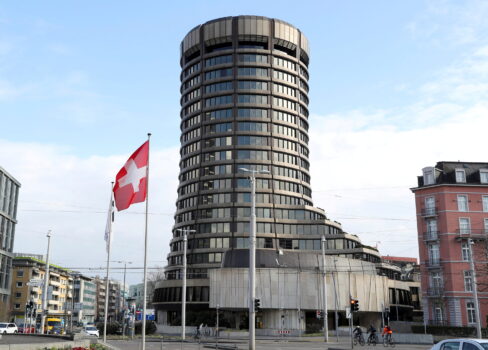 The tower of the headquarters of the Bank for International Settlements (BIS) is seen in Basel, Switzerland, on March 18, 2021. (REUTERS/Arnd Wiegmann)
The tower of the headquarters of the Bank for International Settlements (BIS) is seen in Basel, Switzerland, on March 18, 2021. (REUTERS/Arnd Wiegmann)
America Aided Communist China’s Rise
According to Pillsbury, the United States showed China the way to become a superpower despite Beijing’s initial reluctance.
An example was the Bank of International Settlements, the prestigious club of rich countries’ central banks. China joined the club in 1996. According to Pillsbury, China didn’t want to do it initially. “We are not a capitalist country. We are not going to the Bank of International Settlements,” they said.
Yet the United States persuaded them by explaining the benefits, “You will learn what all the other central banks are planning for the coming year in terms of interest rates, reserves, and so forth,” he said. And in the same way, Washington helped Beijing with entering the World Bank, the International Monetary Fund, and other U.N. specialized agencies, said Pillsbury.
The World Bank played an integral role in assisting China’s rise. Pillsbury, in his book, wrote that at a meeting with former CCP leader Deng Xiaoping in 1983, World Bank executives “secretly agreed that a team of economists would study China intensively and, looking ahead twenty years, recommended how China could catch up to the United States.”
The World Bank team, he wrote, made a series of private recommendations in 1985, consciously endorsing the CCP’s socialist approach with “no genuine effort to advocate for a true market economy.”
Decades later during the pandemic, the United States would continue to give China a free pass, Pillsbury noted. In August 2021, the U.S. intelligence community issued an inconclusive report at the end of a 90-day COVID origin investigation ordered by President Joe Biden. According to the report, the Chinese regime would need to fully cooperate with an investigation to determine whether or not the virus came from a laboratory in Wuhan.
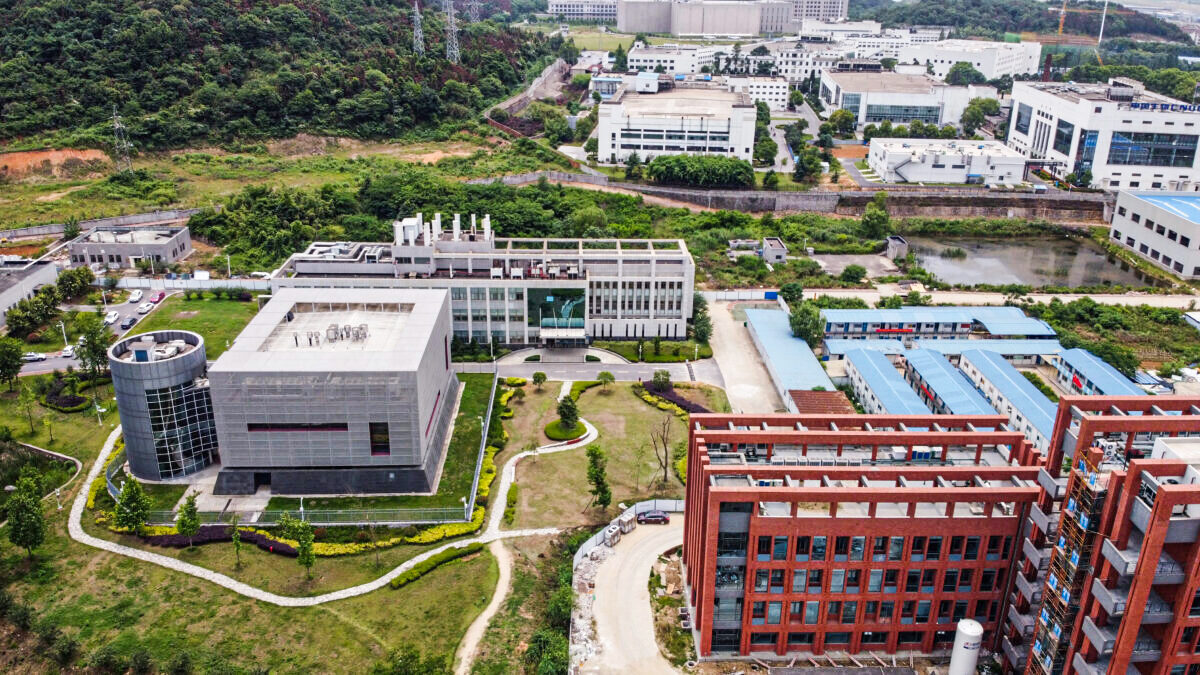 The P4 laboratory on the campus of the Wuhan Institute of Virology in Wuhan, Hubei Province, China, on May 13, 2020. (Hector Retamal/AFP via Getty Images)
The P4 laboratory on the campus of the Wuhan Institute of Virology in Wuhan, Hubei Province, China, on May 13, 2020. (Hector Retamal/AFP via Getty Images)
“What wishful thinking it is to think we can stroll into the Wuhan laboratory and say, ‘Please show us your books. Please show us your samples. Please show us your experiments,’” said Pillsbury.
Earlier in April 2020, Washington Post columnist Josh Rogin revealed that U.S. diplomats and officials warned in a 2018 cable—two years before the pandemic—about the “grave safety concerns” at the Wuhan Institute of Virology (WIV), a biosafety level 4 lab specializing in the study of bat coronaviruses.
“And what do we say about it being unsafe? Condemn this lab or close it down? Get a team in there to see if the PLA [People’s Liberation Army] is making nerve gas or not. No. The recommendation was to give money to the lab to upgrade its safety,” said Pillsbury.
“Our government officials still see China as a friend and an ally,” he added.
Personal Wake-up Call
In his book, Pillsbury wrote that he bought into such wishful thinking for many years, and was himself a member of the U.S. team that aided China’s rise, having held postings in the Department of Defense and State Department.
In 1997, he started questioning the story that China was on the road to democracy. That year, he visited a village near Dongguan in southern China’s Guangdong Province to witness the emerging “democratic” elections. Through conversations with locals in Mandarin, Pillsbury discovered the unwritten rules of the game: candidates were not allowed any public rallies, advertisements, or campaign posters.
The candidates were also prohibited from criticizing any CCP policies. “The only thing a candidate could do was to compare his personal qualities to those of his opponent. Violations of these rules were treated as crimes,” he wrote.
Pillsbury, in the interview, mentioned another critical moment in the past decades: Beijing complained that the United States was slow in sharing new scientific discoveries with China: they hadn’t received information about a nanotechnology discovery published in the journal Scientific American. As a result, America created a minister counselor for science and technology in the U.S. embassy to facilitate scientific transfers to China.
Recommendations
Pillsbury said his first policy recommendation to counter Beijing’s designs was to document the current competitive landscape. “We’ve got to get the public to understand how close China is to surpassing us now, sector by sector,” he said.
In the interview, he also mentioned “a huge challenge over the defense of Taiwan,” the democratic self-ruled island that Beijing views as its own territory. Pillsbury considered the Taiwan Policy Act of 2022—a bill that provides almost $4.5 billion security assistance to Taiwan in the next four years and stipulates severe sanctions to deter China from escalating hostile actions against the island—very important, describing it as a “new focus on Taiwan policy.” While the bill may not pass during this Congress, it has a shot when the Republicans take over the House in 2023, according to Pillsbury.
The author made 12 policy recommendations in his book, but the first he considers the most important. He ended the book with:
“The first step, recognizing that there is a marathon, may be the most difficult to take, but it is also the most important.
“America may fail to recognize the problem and may refuse to face the long-term scenario of China not only surpassing us but also growing to double and then triple the size of our economy, by 2049. Then China will have won, by default.”












